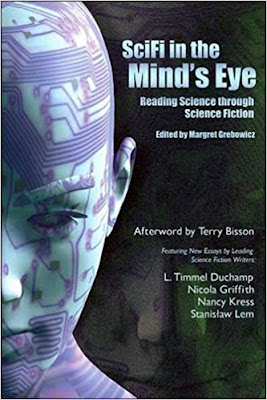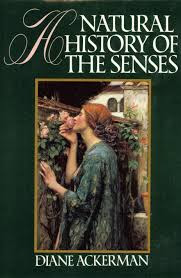Science Vs. The Fiction
ETHICS, SCIENCE,
AND SCIENCE FICTION
By Nancy Kress
A very interesting
and intriguing report Nancy Kress gives us on the role of Science Fiction(SF),
in mending our realities. She very lucidly pulls out examples of different SF works,
and elucidates in simple language, the impact of the writers on predicting the plausibilities
of our future.
She begins by
defining SF as a “near-future story or novel” that takes a serious note of what
is to be done with today’s available technological and scientific advancements.
From movies like Star Wars and Star Trek, to works of magic realism by
Borges and Garcia Marquez, Science Fiction is a very big galaxy, dealing with
stories of space adventure, scientific puzzle, engineering speculation, and
social extrapolation, with media tie-ins, explains Kress.
Science Fiction
raises many ethical questions on prevailing conditions of technology on how it
is used, applied, and the outcomes of its role in the society. These ethical
dilemmas have been closely examined and enquired by SF writers from Mary Shelley
and H.G.Wells, till the writers of this day. And Kress presses on a manner in
which these writers elegantly approach these dilemmas. She categorises the
approach in four important ways, personalization, negativity, timing, and
distortion.
PERSONALIZATION: Kress
relates to us, on how SF writers are different from ethicists, theologians, or
scientists, whose arguments are either logical or abstract. SF writers on
the other hand focus on the consequences and moral implications by embedding
them in a story. So, the appeal is directly to the readers’ emotions. The
events of the story, caused by scientific intrusion, are affecting people whom
readers come to care about, she explains. And hence the result, which becomes
very personal. So, this becomes the power of any fiction.
 She gives the
example of Neville Shute’s “On the Beach” which never told the readers, but
made them feel, what nuclear war was. The SF writer modifies the very
attitude of the reader towards what Science could do to them. They start having opinions about the particular mode of Science/technology that the author or
the filmmaker talks about to them.
She gives the
example of Neville Shute’s “On the Beach” which never told the readers, but
made them feel, what nuclear war was. The SF writer modifies the very
attitude of the reader towards what Science could do to them. They start having opinions about the particular mode of Science/technology that the author or
the filmmaker talks about to them.
NEGATIVITY: This aspect
of SF, lies in the very ‘nature of fiction’, observes Kress. She says, “Nobody
wants to read a story in which a group of people make a scientific discovery or
technological breakthrough, implement it without opposition, and reap only
positive results.” The readers need a masala of conflicts, drama, problems
and disaster. Ultimately, the question that revolves every SF writer’s mind is “Who
will this hurt?” That’s the person he/she writes about. It makes a better
story.
A myriad of famous
examples she poses to explain the concept. The difficulties faced by Mary
Shelley’s scientist Dr. Frankenstein; The Eloi and the Morlocks of H.G.Wells’
genetic experiments not ending in a happy society; and William Gibson’s
adventures in the cyberspace, do not always do the right thing she declares.
The mistakes made, the situations exploited, and the people that are harmed are
the tools that make a better story, affirms Kress.
TIMING: The
SF writers seem to absorb the consequences, which may blow up as realities in
the future, way before time. The Science Fiction works serve as an early warning system of the incoming
dilemmas, says Kress.
Arthur C.Clarke’s “Childhood’s End” and Alfred
Bester’s “The Stars My Destination” are works which do not visualize the
future, but a future which leads to one of the many possible destinations
where the adversity of Science and Technology may lead us to.
When Larry Niven for example, told in his
stories about “Organ Transplant” and
“Illegal Organ Trading” more than
fifty years ago, no one was listening except the SF readers. But today, we can
witness real such cases where people are hunted for organ trade. Kress
magnifies the idea of how fictional
ethical discussion varies from real-world ethical discussions through such
instances. She brings out extraordinary outbreaks of SF visions, such as “Frankenfoods” and “Crop mutations”. She rightly points out that, SF was there when journals,
bioethics departments, commissions, or advisory panels were clueless of such destructive
issues. So, it is evident that readers might assimilate such ethical concepts decades
before anyone might even dream of it, even though it is nurtured through
personal, emotional, and often negative biased medium of Science Fiction.
Kress produces a
quote from Kurt Vonnegut’s 1965
novel God Bless You, Mr. Rosewater, in which the protagonist
addresses a group of SF writers:
“You‘re all I read anymore. You’re the only ones who’ll talk about the really terrific changes going on, the only ones crazy enough to know that life is a space voyage… You’re the only ones zany enough to agonize over time and distances without limit, over mysteries that will never die, over the fact that we are right now determining whether the space voyage for the next billion years or so is going to be Heaven or Hell.”
“You‘re all I read anymore. You’re the only ones who’ll talk about the really terrific changes going on, the only ones crazy enough to know that life is a space voyage… You’re the only ones zany enough to agonize over time and distances without limit, over mysteries that will never die, over the fact that we are right now determining whether the space voyage for the next billion years or so is going to be Heaven or Hell.”
From the book,
SCI-FI IN THE MIND’S EYE, by Margret Grebowicz
(TO BE CONTINUED...)
Image Courtesy: Google



Comments
Post a Comment
Your comments and suggestions are highly valued! Please leave a comment below...